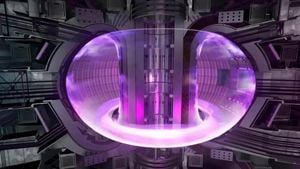Japan's ambitious plans for its new Epsilon S rocket faced another setback with the recent explosion of its engine during testing. On November 26, 2024, the Japan Aerospace Exploration Agency (JAXA) conducted the test at the Tanegashima Space Center, located on the southern island of Tanegashima. Unfortunately, just 49 seconds after ignition, the engine erupted, resulting in both flames and significant debris being scattered around the site.
The incident, described by various media outlets as dramatically unfortunate, marks the second engine failure for the Epsilon S program within 16 months. Previous tests had already instigated delays, raising concerns over the rocket's reliability and its scheduled debut flight, originally set for March 2025.
According to JAXA officials, the combustion test was only meant to last two minutes, during which time the rocket engine was expected to burn fuel under controlled conditions. Instead, this latest test was met with alarm as observers noted the loud explosion and visible fire from some distance away.
Takayuki Imoto, the project's manager, expressed the agency's regret over the incident during an online press conference shortly after the explosion. “We are very sorry to have failed to meet expectations,” he stated, underscoring the impact this incident may have on Japan's reputation within the competitive space industry.
Following the explosion, JAXA announced it would launch a thorough investigation to determine the causes behind the combustion malfunction. Imoto emphasized the importance of learning from failures, stating, “We can learn from failure. We will take advantage of this opportunity to develop a more reliable rocket.” Recovery teams have been dispatched to secure any remains of the engine to assist them with their analysis.
While there were no injuries reported as a result of this malfunction, the blast did not come without repercussions. The Tanegashima Space Center itself will require extensive repairs, which may take several months before testing resumes. Those delays are anticipated to affect the timeline of Epsilon S's future launch, as some experts now predict the inaugural flight may be pushed back even later than initially projected.
The Epsilon S rocket is regarded as a significant advancement over its predecessors, featuring improved performance and enhanced payload capacity. Based on the Epsilon rocket family developed by JAXA and the Japanese aerospace company IHI, these rockets are primarily aimed at launching small satellites at lower costs, which is becoming increasingly prominent as the commercial space industry expands.
To put the stakes involved here in perspective, Japan's space agency has faced various hurdles over the last couple of years. For example, the H3 rocket, which was launched last year, failed on its first attempt but saw successes later on, launching Japanese satellites and securing international contracts. There’s increasing pressure on JAXA and IHI to present trustworthy models as competition intensifies, particularly from established companies like SpaceX.
The Epsilon program was initially celebrated for its relatively fast turnaround times and cost-effective launches, allowing for more frequent satellite deployments. Nevertheless, incidents like these explode those hopes, making stakeholders wary of future plans. Experts have muted their optimism for the upcoming missions, with some speculating about the potential necessity for JAXA to rethink its entire strategy moving forward.
The previous test failure of the Epsilon S also saw flames erupt during pre-launch tests last July, raising alarm bells among the engineering teams working on the project. It was determined at the time the ignition systems had sustained thermal damage, leading to the device's destruction. This has now evolved to pave the way for engineering challenges and setbacks, as each failure requires extensive investigation and reassessment.
Overall, JAXA's setbacks cast shadows on the urgency and need for effective development methods within Japan's burgeoning space industry. This latest explosion adds more layers to the complexity of achieving grand space objectives and conducting risk assessments of state-funded projects. Japan's aspirations to maintain itself as a reliable player within the global space community continue to clash with operational realities, leaving its engineers to grapple with pressing needs for success against the backdrop of trending failures.
Moving forward, as JAXA and its partners turn their focus to identifying the causes of these fires and explosions, one question remains: how will they adapt their practices to prevent such dramatic setbacks from occurring once again?



